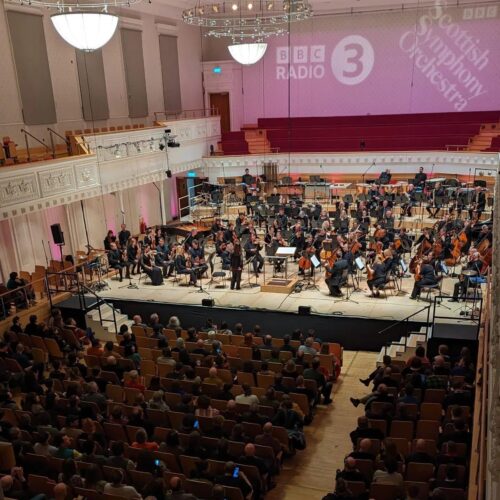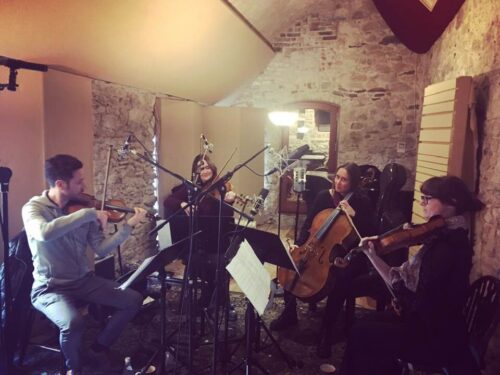Press

“Most impressive, however, was Mallacht by Cork-born Linda Buckley, a massive, monumental work of churning cross-fade harmonies and colliding chords, at once hewn from stone and yet alive with authentic emotion. Her ecstatic, drum-pounding, brass-heavy climax had all the power of Sibelius and Anna Thorvaldsdóttir rolled into one. Mallacht proved a magnificent end to a joyfully diverse opening day, and summed up all the power and emotion that Tectonics can conjure.” (David Kettle, The Scotsman on Mallacht, BBC Scottish Symphony Orchestra)
“The full orchestra performed Linda Buckley’s Mallacht (curse), the evening’s second BBC commission. A programme note alluded to the piece being steeped in Buckley’s musical background of traditional Irish unaccompanied sean-nós singing; Mallacht combines imaginative orchestration and subtle electronics within which eerie, almost-comprehensible human voices emerge and recede back into primordial textures. The violas break the spell with a raw, highly charged figure that is taken up by the full ensemble, leading from the timeless stasis of the opening to a cathartic conclusion.” (David Lee, The Guardian)

“This is a seriously impressive disc. Buckley’s genius in this remarkable cycle lies in the crafting of something genuinely new and strange from instrumental and synthetic resources. Her adoption of the sean-nós style in Ó Íochtar mara helps to bind the listener to the distant past and strikes one as utterly unaffected and sincere.” (Richard Hanlon, MusicWeb International)
‘There’s a lot of really beautiful music on this record.’ (Iggy Pop on BBC 6 Music)
‘Buckley’s music traverses a fault line between discomfort and great beauty. The works on this album are captivating; I couldn’t tear myself away.’ ★★★★ BBC Music Magazine
‘What is particularly striking about Buckley’s work is the way in which the ear is seduced into these dark territories…the intensity of her work is irresistible.’ Tim Rutherford-Johnson, The Rambler
‘The Irish composer combines traditional séan-nos singing with an electronic soundscape, connecting past and future … It’s clear how much Buckley deeply connects her past to her present, opening up possibilities for our mutual musical futures.’ Guardian – Folk Album of the Month
‘Music of mythic magic … In Kyrie, this ecstasy is sublime as well as brilliant – it’s summoned from the places between and beyond Linda’s voice and these electronics, all taken out of themselves to find something richly and strangely powerful.’ BBC Radio 3 New Music Show
‘Linda Buckley is unquestionably one of the most exciting, prolific, and as mentioned elsewhere, ‘ecstatic’ composers to come from Ireland in recent times.’ Sean Clancy, RTÉ
‘diverse and ultra imaginative work, intense and shimmering…’ BBC Radio Scotland
‘Intelligent, atmospheric and strangely beautiful.’ ★★★★ Songlines
do you remember the planets:
“Fantastically brutal, reminiscent of the glitch music of acts such as Autechre.”
Chiyo: “Beautiful intertwining string textures”
Ó Íochtar Mara: “Direct emotionality”
– Liam Cagney, Composing the Island
“Buckley’s Error Messages (2006), leisurely arpeggios meet shuddering static, is exquisite.”
-Philip Clark, Gramophone
‘Understated beauty’ is close to being a cliché when speaking of Linda Buckley’s music, but that is how the composer herself describes the poetry of Chiyo-ni. The work of this 18th-century Haiku poet is a perfect match for the gentle simplicity of Buckley’s, and through chiyo, the composer achieves a graceful balance. This work is a commission by the RTÉ National Symphony Orchestra, and makes use of the large force well, though without sacrificing the subtlety characteristic of her other works.
-Anna Murray
Available from Ergodos (download only) is Linda Buckley’s Immersia, a 16-minute EP of ambient electronica. In three parts, its first movement in particular is glacially majestic, played on what sounds like a flanged synthesiser or mellotron. There are echoes of the band Tangerine Dream on this fascinating work by the Cork-born composer.
The continuous flow is absorbing and you can’t wait to hear what it will bring you to, but it’s not the arrival that matters, it is the journey. Immersia, part one, is essentially one chord, with the player’s hand stretching for additional notes, effects and accents, sounds that are almost like train whistles. Did I imagine that or did I actually hear it, you find yourself asking at one point about what sounds like a phone ringing in the middle of the river of sound?
In part two, Buckley breaks the majestic sweep of part one into fragmented notes, with echoes of Massive Attack’s 100th Window album. Part three seems to break it even further down, to finish in a slow fumble of organ notes, the inscrutable drama of the piece gone, the train exhausted as it enters the final station.
-Paddy Kehoe, RTE Ten
Downloads:
Links:
- Composer page for Linda Buckley on the website of the Contemporary Music Centre Ireland
- Interview by Tim Rutherford-Johnson
- Interview by Bob Gilmore for CMC Ireland
- Composer Q&A with Sound Scotland
Video:
RTÉ Lyric FM composer-in-residence interview:
UCC graduate profile:
The Family of Things interview:
Discordia: